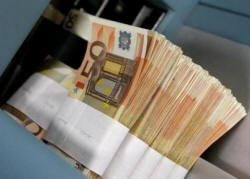|
 Euro
steadies, Aussie up after core inflation Euro
steadies, Aussie up after core inflation
 Send a link to a friend
Send a link to a friend
[April 22, 2015]
By Patrick Graham
LONDON (Reuters) - The euro recovered some
ground against the dollar on Wednesday in the absence of major news on
Greece, while the Australian dollar rose after inflation data suggested
an interest rate cut was not imminent.
|
|
 In a subdued session for most major currencies, sterling gained
around half a percent against a basket of its peers <=GBP> after
Bank of England minutes that emphasized hopes for a further
improvement in the UK economy over the next year. In a subdued session for most major currencies, sterling gained
around half a percent against a basket of its peers <=GBP> after
Bank of England minutes that emphasized hopes for a further
improvement in the UK economy over the next year.
The threat that Greece could fall out of the euro in a disagreement
over the terms of financial aid from the rest of Europe has yet to
show up to any great extent in the price of the single currency.
Many analysts and investors say a Greek exit from the euro prompted
by Athens running out of funds in May or June could knock the euro
swiftly below parity with the dollar. But for the moment the market
still believes the ability of European policymakers to avert that
scenario.
"Greece is certainly something that is continuing to be in focus
given that we still don't have a bailout deal," said Phyllis
Papadavid, Senior Global FX Strategist with BNP Paribas in London.

"The euro has really been stuck in a range for the past couple of
weeks and I would put that down rather to the dollar being in a
consolidation phase. Once we see U.S. data improve the bias is
definitely for the dollar to gain further."
After some early gains in Europe, the euro was up 0.3 percent on the
day at $1.0770 and 0.2 percent at 128.66 yen.
The Australian dollar <AUD=D4> was the day's biggest mover, gaining
more than 1 percent to $0.7794 after data showed core inflation of
0.6 percent in the first quarter, higher than a forecast of 0.5
percent.
Signals from Australian central bank chief Glenn Stevens and minutes
of the bank's April 7 meeting, all of which were seen as raising the
prospect of an interest rate cut in May, have weighed on the
currency this week.
[to top of second column] |

"The case (for easing rates) hasn't disappeared... but it certainly
reduces the chance a little bit more for May anyway," said David De
Garis, a senior economist at National Australia Bank.
Against the yen the dollar stood at 119.63 yen, flat on the day and
not far from a one-week high of 119.83 set overnight.
Sterling rose 0.9 percent to hit a five-week high above $1.50,
helping push the dollar index down 0.4 percent to 97.81. That again
cast doubt on whether there is much real concern about the
currency's fate around British elections due in just two weeks,
although traders said any further gains were unlikely.
"I can't see a massive sustained rally with so much political
uncertainty," said one London-based spot trader. "The election
concerns will keep sterling rallies limited."
(Additional reporting by Ian Chua and Anirban Nag; Editing by Hugh
Lawson)
[© 2015 Thomson Reuters. All rights
reserved.] Copyright 2015 Reuters. All rights reserved. This material may not be published,
broadcast, rewritten or redistributed.
 |